PRINCETON, NJ -- The Democratic convention appears to have helped solidify support for Barack Obama among former Hillary Clinton supporters, with the percentage saying they will vote for Obama in November moving from 70% pre-convention to 81% after the convention, and the percentage certain to vote for Obama jumping from 47% to 65%.
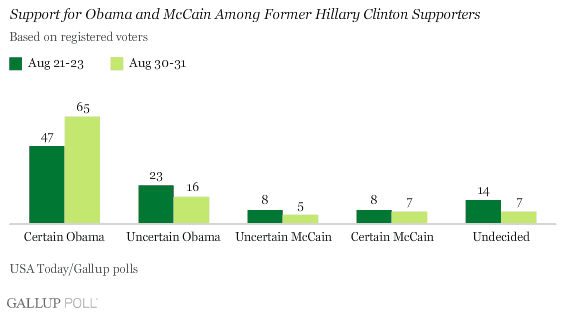
Other pre and post comparisons show that Obama gained modestly in his positioning against John McCain on several dimensions, including the perception that he is better able to handle terrorism and the situation in Iraq, and that he is a strong and decisive leader.
Pre- and Post-Convention Surveys
The analysis reported here compares interviews conducted Aug. 21-23, prior to the beginning of the Democratic National Convention, to interviews conducted Aug. 30-31, days after the conclusion of the convention.
The main purpose of the comparisons is to provide an initial measurement of the impact of the convention on the images of the two candidates (and the two parties) coincident with the convention. This year's timeline provides a challenge of interpretation. In addition to the Democratic convention, the time period between the two surveys being compared here also encompassed McCain's surprise announcement of Alaska Gov. Sarah Palin as his vice presidential running mate on Friday, and the intensifying news coverage of the approach of Hurricane Gustav throughout the rest of the weekend. Nevertheless, the comparisons give us a basic indication of the overall impact of the convention.
Tracking Hillary Clinton Voters
The Democratic convention appears to have increased certainty of support for Obama among Democratic voters, including in particular among the critical group of Democrats who earlier this year supported Hillary Clinton in the Democratic primaries (see graph above).
Much attention was given to the fact that only 47% of former Clinton supporters said they were certain to vote for Obama in the pre-convention USA Today/Gallup poll, and that 16% of these voters said they were going to vote for McCain, with another 14% undecided.
The new polling shows that many of these disaffected Clinton voters have now returned to the loyal Democratic fold. The percentage of former Clinton voters who say they are certain to vote for Obama has now jumped to 65%. Although 12% of former Clinton voters persist in saying that they are going to vote for McCain, that's down from 16%, and the percentage who are undecided has dropped in half.
Overall, support for Obama among this group has moved from 70% pre-convention to 81% post-convention.
To be sure, former Clinton supporters are still less enthusiastic than former Obama supporters in the post-convention poll. And, the fact that 12% still say they are going to vote for McCain is no doubt troubling to the Obama camp. But it appears that, from a broad perspective, the concentrated effort by Obama's campaign managers to feature both Hillary and Bill Clinton in prominent roles, and efforts by Hillary Clinton to emphasize her support for Obama going into the November election, may have paid off.
Finally, certainty to vote for Obama also moved up from 80% to 87% among voters who previously supported Obama in the Democratic primaries, further suggesting that the Democratic convention had the effect of solidifying party support for the Obama candidacy.
Favorable Ratings of the Two Candidates
There was only slight change in the basic images of the two major party candidates in the time period between these two polls. The basic expectation would ordinarily be that Obama's image would become more positive while McCain's would become more negative as a result of the Democratic convention. The data show that Barack Obama's favorable rating actually dropped very slightly by two percentage points, while McCain's favorable rating dropped by a larger 5-point margin, the latter more in line with expectations.
All in all, Obama now has a 7-point higher favorable percentage than McCain, only slightly more positive for Obama than the 4-point margin he held over McCain pre-convention.
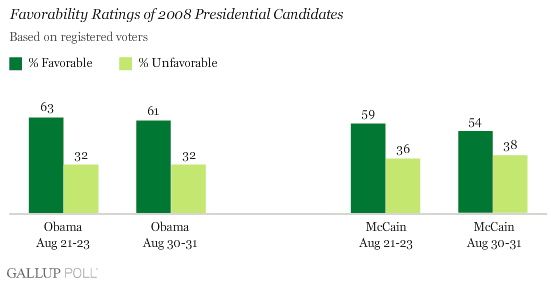
More Detailed Images of the Two Candidates
The Saturday and Sunday interviewing asked Americans to assess whether McCain or Obama would better handle three key issues: the economy, terrorism, and the situation in Iraq. The surveys also included measures of the positioning of the candidates as best fitting three descriptive phrases: "is a strong and decisive leader", "shares your values", and "is honest and trustworthy".
The comparison of the pre-convention to post-convention data show that Obama picked up at least slightly on all six of the dimensions, although for one dimension -- best able to handle the economy -- the change was not statistically significant.
Here's a look at the percentage of Americans choosing Obama on each of these six issues and characteristics, pre-convention and post-convention:
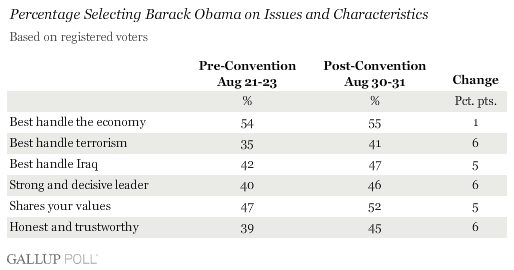
As a result, Obama is now rated about even with McCain on the situation in Iraq, and has cut into McCain's lead on terrorism. Obama maintains a big advantage on the economy. Importantly, Obama is now even with McCain on the leadership dimension, which was a strong point for McCain prior to the Democratic convention, and Obama has gained an advantage on honesty, where the two were formerly tied.
The types of gains seen for Obama are generally what we would expect from a convention, which is, after all, a period of time in which the media focus is fairly exclusively on positive messages put out by one party and one presidential candidate.
In this situation, this positive flow of information about Obama appears to have moved the needle in Obama's direction on five out of six dimensions polled. McCain will have a chance to reverse some of these shifts with the Republican National Convention this week.
McCain and Bush, Obama's Experience
The percentage of Americans who profess to be "very" concerned that John McCain would pursue policies too similar to those of President Bush moved up slightly between the two surveys, from 41% to 47%. At the same time, the percentage "somewhat" concerned dropped slightly, such that the total percentage of Americans concerned about this McCain to Bush connection stayed fairly stable.
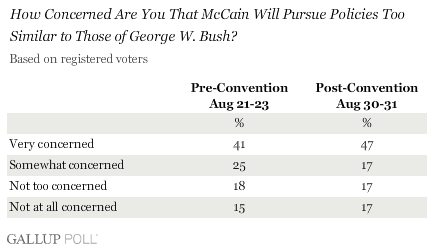
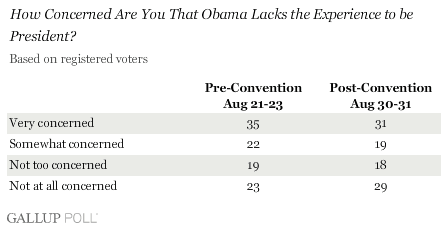
There was also a slight shift in Obama's favor in perceptions of his experience. There has been a 7-point drop in the percentage of Americans who say they are very or somewhat concerned that Obama lacks the experience necessary to be president since the Democratic convention.
Images of the Two Parties
There was almost no change in the images of the Republican and Democratic parties over the time period encompassed by these two polls.
The Democratic Party continues to have a significantly higher favorable image than the Republican Party, as it has all year, and the convention and other events of the last week seem to have little impact on these images.
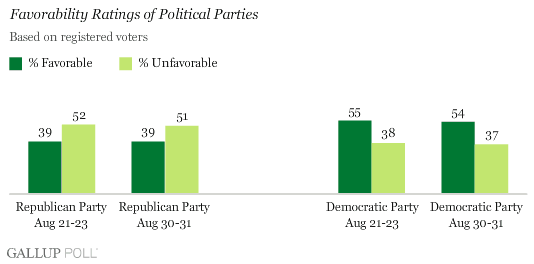
Implications
All in all, the Democratic convention appears to have accomplished -- at least to a modest degree -- some of the objectives Democratic leaders were probably hoping for. A healthy percentage of former supporters of Hillary Clinton, many of whom were public in their disaffection for Obama before the convention, appear to have returned to the fold and now say they are certain to vote for the Democratic nominee. This no doubt reflects the fact that Hillary (and Bill) Clinton were accorded an extraordinary amount of attention during the convention, and that Hillary Clinton was very vocal in declaring her loyalty and support for Obama.
Still, 19% of former Clinton supporters continue to say they are either going to vote for McCain or are currently undecided, indicating that there may be some residual anger which has not yet been dissipated by Obama's efforts, and that there is still work to do for the Democrats to bring the remaining Clinton supporters into the Obama camp.
The convention also appears to have improved Obama's image on several dimensions, including several which have been McCain's heretofore strengths: handling terrorism and being perceived as a strong leader, in particular.
The focus now will be on the extent to which the GOP convention in St. Paul will reverse Obama's recent gains in favor of McCain on these image dimensions -- something which will not be discernible until polling conducted this weekend after the convention ends.
Survey Methods
Results are based on telephone interviews with 1,835 registered voters, aged 18 and older, conducted Aug. 30-31, 2008. For results based on the total sample of national adults, one can say with 95% confidence that the maximum margin of sampling error is ±2 percentage points.
Interviews are conducted with respondents on land-line telephones (for respondents with a land-line telephone) and cellular phones (for respondents who are cell-phone only).
In addition to sampling error, question wording and practical difficulties in conducting surveys can introduce error or bias into the findings of public opinion polls.
To provide feedback or suggestions about how to improve Gallup.com, please e-mail feedback@gallup.com.
